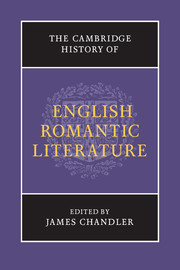Book contents
- Frontmatter
- Introduction
- Part I The Ends of Enlightenment
- 1 Sentiment and sensibility
- 2 Antiquarianism, balladry and the rehabilitation of romance
- 3 The Romantics and the political economists
- 4 The problem of periodization: Enlightenment, Romanticism and the fate of system
- Part II Geographies: The Scenes of Literary Life
- Part III Histories: Writing in the New Movements
- Part IV The Ends of Romanticism
- Chronology
- Bibliographies
- Index
- 1 A New Pocket Map of the Cities of London and Westminster; with the Borough of Southwark, Comprehending the new Buildings and other Alterations, 3rd edn (London: William Faden, 1790).">
- References
1 - Sentiment and sensibility
from Part I - The Ends of Enlightenment
Published online by Cambridge University Press: 28 May 2009
- Frontmatter
- Introduction
- Part I The Ends of Enlightenment
- 1 Sentiment and sensibility
- 2 Antiquarianism, balladry and the rehabilitation of romance
- 3 The Romantics and the political economists
- 4 The problem of periodization: Enlightenment, Romanticism and the fate of system
- Part II Geographies: The Scenes of Literary Life
- Part III Histories: Writing in the New Movements
- Part IV The Ends of Romanticism
- Chronology
- Bibliographies
- Index
- 1 A New Pocket Map of the Cities of London and Westminster; with the Borough of Southwark, Comprehending the new Buildings and other Alterations, 3rd edn (London: William Faden, 1790).">
- References
Summary
For much of the second half of the eighteenth century the language of feeling, with its key terms of sentiment, sympathy and sensibility, was central to the discussion of man and society, manners, ethics and aesthetics. In its concern with interiority – with feeling, the human psyche and the creative imagination – its emphasis on the ethical and psychological power of literature, its concern with everyday life, and the debate it provoked about the effects – chiefly malign – of the publishing industry, critics and the literary system, the literature of sentiments and sensibility rehearsed many of the issues and deployed some of the language we tend to associate with ‘Romanticism’. At the same time sensibility has its own history, anchored, as we shall see, in the material conditions of the production, dissemination and consumption of literature in the period between the mid-eighteenth century and the French Revolution. To apprehend both this history and its possible relations to what subsequently was called Romanticism, we need to characterize sensibility less as a body of ideas or as a discourse deployed across a series of texts than as the site of a major dispute about how to understand, express and affect man’s capacity for moral deliberation and action. This debate about man’s moral consciousness and its relations to literary technology – both in the sense of a poetics of sentiment and of mechanisms of literary production – was sensibility’s inheritance to Romanticism.
Keywords
- Type
- Chapter
- Information
- The Cambridge History of English Romantic Literature , pp. 19 - 44Publisher: Cambridge University PressPrint publication year: 2009
References
- 5
- Cited by

